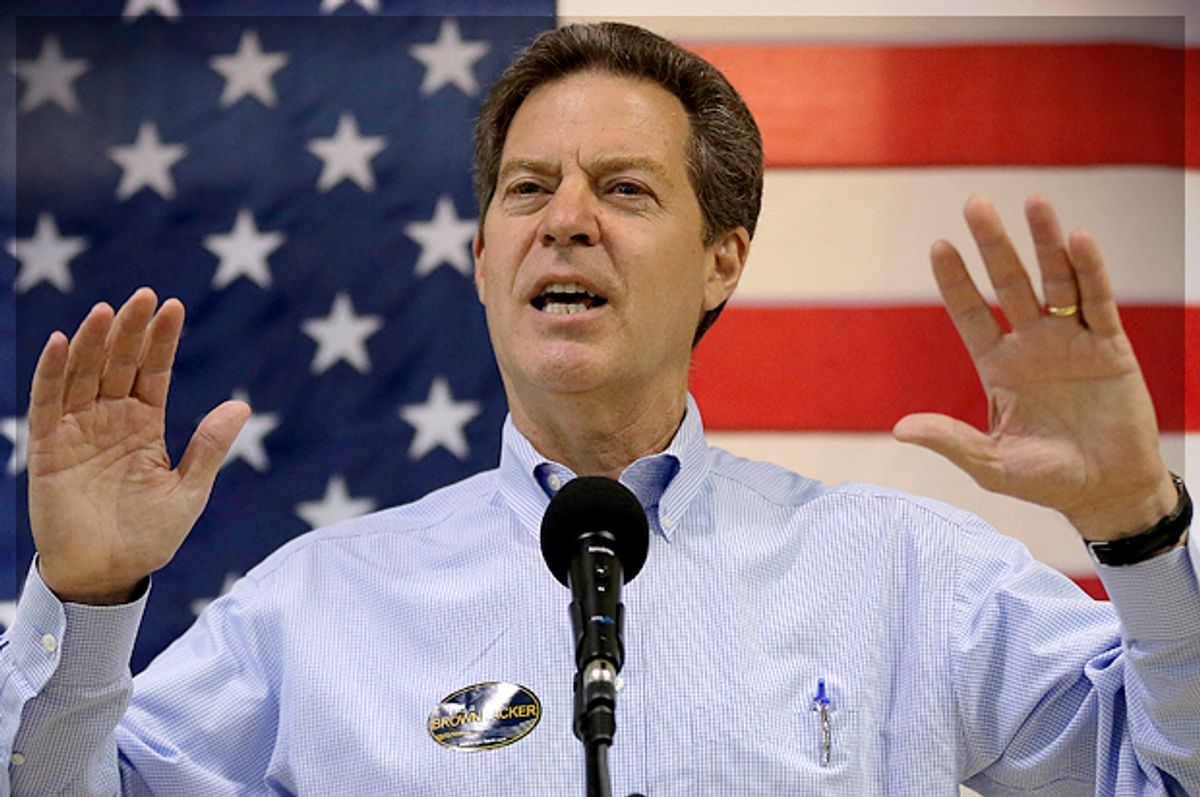Staring down a $280 million budget shortfall, Sam Brownback confronts a politically fraught choice as he prepares for his second term as Kansas governor. Should the conservative Republican renege on his signature tax cuts, which have wreaked fiscal havoc on the state, or follow the Grover Norquist playbook and shrink state government to the size at which it can be drowned in the bathtub?
Campaigning for re-election this year, Brownback staunchly defended his drastic income tax cuts, vowing to proceed full steam ahead if voters gave him another four years in office. But just days after Brownback won a narrow victory over Democratic challenger Paul Davis, state revenue analysts performed the discourtesy of announcing that the state's fiscal outlook was even worse than initially realized. Lawmakers, the revenue analysts said, would need to make up a $280 million shortfall by June. Moreover, the state's reserve fund -- which contained $379 million this summer -- was on course to be completely depleted, they said.
The conservative response was predictable. Just as they had during the campaign, Brownback's right-wing allies knew just whom to blame for the figures. The state's fiscal climate wasn't the fault of Brownback and his supply-side economic experiment, they said. Instead, liberals were the real culprits, since they wouldn't swallow the massive spending cuts that would have been required to pay for Brownback's tax cuts.
“The new revenue estimates only highlight the continuing need to protect core services while streamlining state government. We do not have a revenue problem. We have a spending problem,” Republican state House Speaker Roy Merrick said last month.
Given that Kansas has already implemented some of the country's largest cuts in education funding, slashed mental health services (after which suicides spiked by 30 percent), and kicked more than 1,400 disabled people off its Medicaid rolls, it's unclear what other savage cuts Merrick and Co. would have Brownback pursue. The governor himself has already given Kansans an idea of what the next four years have in store, announcing last week that he will cut highway funding and reduce contributions to the state's pension fund, which is already one of the worst-funded in the nation.
But Brownback may also rethink his tax cuts, the New York Times reports today. Though he didn't specify which tax policy changes the governor is considering, state budget director Shawn Sullivan told the paper, “Everything is on the table, including the tax policy.”
Here's the problem: Brownback may have created a Frankenstein's monster that will prevent him from making even a slight course correction on taxes. Despite its rock-ribbed Republican reputation, Kansas was once a bastion of political moderation, with a coalition of moderate Republicans and Democrats reining in conservative excesses. But whereas the state previously elected Democrats or centrist Republicans to the governor's mansion, the stridently conservative Brownback's election in the banner GOP year of 2010 marked a dramatic political shift. Once in office, Brownback moved to cement the right wing's hold on the state, supporting conservative primary challenges to moderate GOP lawmakers in 2012. The governor's purge largely succeeded; the GOP boasts supermajorities in both chambers of the state legislature, and GOP moderates now constitute nothing more than a rump faction.
The Brownback-boosted conservatives may now scuttle any effort by the governor to raise taxes in his second term. Outside conservative groups are already signaling that they'll vociferously oppose any U-turn on the issue. “No, we don’t need more revenue,” Dave Trabet, head of the right-wing Kansas Policy Institute, told the Times. “There needs to be a very detailed analysis done on every agency and every function to look at how we can bring down the cost of government.”
Ironically, bringing down the cost of government may depend in large part on Obamacare, the bane of conservatives' existence. As Dylan Scott points out, the Affordable Care Act contains a provision whereby "pharmaceutical companies pay rebates to states and to the federal government, based on a percentage of their sales to the Medicaid program that year." As Brownback tries to fill the state's $280 million revenue hole, he is transferring $55 million in revenue from the rebate program into the state's general fund.
But the Obamacare funds alone won't make up Kansas' budget shortfall. With just weeks to go before Brownback is sworn in for the second time, a reckoning awaits.

Shares